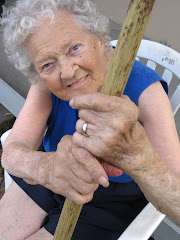I regularly read several online publications about care giving and lately I really want to smack a few authors and a whole lot of commentors. A very common question is "How do I get Mom or dad to stop asking to go home?" or - "How do I get my dad to be nice" or "How do I get Mom to face reality?" There's always some dope who comments like this: "If you respect your parent, you'll tell them the truth...you'll make them see that they need help."..."Tell them their behavior is unacceptable; force them to change."
( Some major eye rolling and HEAVY SARCASM intended) - Yea, right... obviously they do not have an elder in their life and they've never spent more than a day or so helping an aged and sick loved one. That is the absolute WRONG advice. WRONG, WRONG, WRONG!!!!!! Nothing will make your elder and you - but ESPECIALLY YOUR ELDER - more miserable. I've been through this over and over with uncles, grand parents and now with my own parents. It is a rare - I REPEAT A RARE elder, who is realistic about their situation and their abilities. To force them to face reality is simply the cruel, mean thing to do. The truth is harsh and inevitable - joints, eyes and hands all failing; blood pressure and blood sugar up and down; lungs or kidneys working at greatly dimmished capacity; bones that will break with the most minor fall - the inability to make new memories and someday, relatively soon, choices about life support, caskets, cemetery plots and burial clothes - this is the truth, this is the reality. Simple but fearful and painful.
In our culture we insist on truth. We place great value on it; we equate truth with respect. The two do go hand in hand but not in the case where you are dealing with an eldery (and perhaps demented) person in the last stage of their physical life. The truth of their situation is too much to bare. They can't understand that they need multiple medications to maintain their existence. They want to be where life meant the most - at "home" where they felt loved, comfortable and surrounded by the things they earned for themselves.
We - their loved ones, family and friends - are not comfortable with this truth - that they are failing, that they are frustrated, that we can't fix it. There is no logic, there is no pill, no amount of therapy that will help. So why tell them? Why make them understand the gravity of their situation? We will only have to say it again and again. They won't remember so we only frustrate ourselves. We can only make their current existence more tolerable. We can only love them as best we can. We can help them live in a state of denial and it's okay. It's the respectful thing to do; it's the loving thing to do. We tell them that "home" is there just as they left it, waiting. We tell them that when they're better, we'll help them get there. We lie and it's okay.
Years ago my uncle was dieing from lung cancer but in his mind, he would re-couperate. He'd get disability and have all of his time free. He would set up his dream wood working shop and make lovely furniture. We knew the outcome; he had only months, most likely weeks, to live. His surgeon called me one day angry that he was not "moving through the stages to acceptance" of his terminal condition. My reply: "Why is that necessary?" The surgeon could not answer. He could not tell me how my uncle would benefit from the harsh reality that he would soon die. I and my family helped my uncle live his lie. We watched videos of New Yankee Workshop and discussed wood working techniques. We read wood working magazines with him, we planned furniture. Each visit he had hope and looked forward to something. He was not a spiritual man but I know deep down inside he knew his fate. He was distracting himself with another truth - he kept his mind busy dreaming of what he'd do at "home". After all of these years, I know he is "home" and he's busy in his wood shop. He is in the home he dreamt of during that final time of his life. I'm glad we helped him live that lie because it meant that we laughed, continued to share and that he felt good about every one of his last days.
Thursday, February 18, 2010
What's the "best truth" for our elders? The state of denial ain't so bad....
Labels:
denial,
elder care,
emotions,
last days
Subscribe to:
Post Comments (Atom)






No comments:
Post a Comment